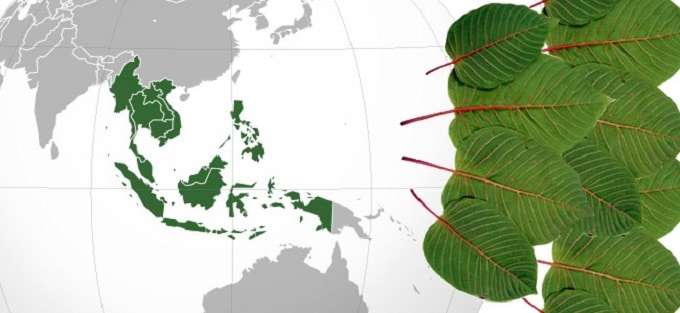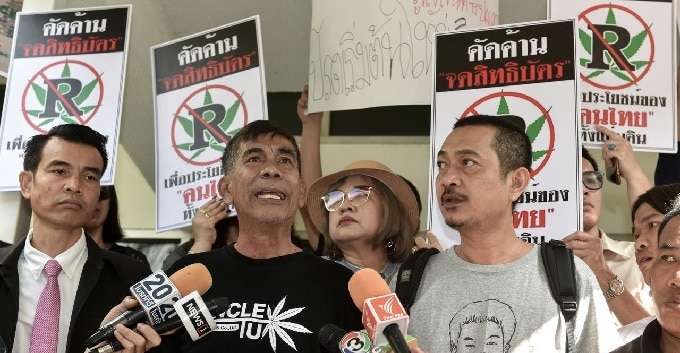The “Land of Smiles” just got a whole lot happier.
After a history of being strictly prohibited throughout the world for almost a century, cannabis is making a serious comeback.
Thailand is one of the countries seeing big changes to its cannabis laws.
Laws and public opinion about cannabis are rapidly changing, and at CBD School we’re committed to keeping you up-to-date with these changes.
No one ever thought Thailand would make a move towards legalizing psychoactive medicines…but they just did.
Unprecedented move from the government

In a landmark move, Thailand just approved the legalization of marijuana and kratom for medical use.
On Tuesday, the junta-appointed parliament made an agreement to amend the Narcotic Act of 1979.
Now in Thailand, the use of medical cannabis and kratom, which is locally grown and already used medicinally as a painkiller and stimulant, will both be permitted for medicinal use.
The vote was passed 166-0.
In a country where medical cannabis was legal and widely used until the 1930s for pain relief and fatigue, cannabis has remained very much illegal for almost a century.
Thailand is a part of Southeast Asia, an area known for some of the harshest drug laws in the world.
In Singapore and Indonesia, possession of large amounts of cannabis are subject to the death penalty.
Malaysia only recently abolished the death penalty for cannabis trafficking.
In Thailand, however, things have taken quite a different turn. It just became the first country in Southeast Asia to legalize medical cannabis.
“This is a New Year’s gift from the National Legislative Assembly to the government and Thai people,” said chairmen of the drafting committee, Somchai Sawangkarn in the televised parliament session that took place on Christmas day.
Changes to the Narcotics Act will officially become law once they are posted in the Royal Thai Government Gazette. This could ultimately take up to four months.
karatom has a long tradition in south east asia

Like marijuana, kratom was traditionally used as medicine in Thailand. Kratom, a tropical evergreen, is native to Thailand, Malaysia, Indonesia, Papua New Guinea, and Myanmar.
Kratom has been used in Southeast Asia for centuries as a stimulant, a remedy in traditional medicine, and in social situations.
Historically, kratom was used by manual laborers (think fisherman and farmers) to improve work productivity and relieve fatigue.
It’s still consumed as a popular substance in village social gatherings throughout several Asian communities.
Kratom has, however, been illegal since 1943 since the passing of the Kratom Act 2486.
This made planting of the kratom tree and possession of kratom leaves illegal in response to an increase in its use when opium became extremely expensive and the Thai government was trying to gain control over the opium market.
While medical cannabis law remain strict elsewhere in Southeast Asia, the biggest controversy regarding legalization has been with the Thai Intellectual Property Department.
According to one reporter for the Nation, “The IP is intentionally ignoring its legal duty in order to benefit transnational pharmaceutical conglomerates by accepting ineligible cannabinoid medicine patent registration applications for consideration.”
The article goes on to say that critics of the IP said that “in the process the department had potentially sabotaged Thai medical research and development based on cannabis.”
With the “New Year’s gift from the government,” the controversy should soon end.
What exactly will medical cannabis and kratom laws look like in Thailand?

While nothing is crystal clear yet, lifted restrictions on medical cannabis and kratom will apply to the use, possession, production, import, and export of both.
Medical cannabis and kratom patients will need a prescription, while suppliers, producers, and researchers will need special licenses to handle plants.
It has not yet been determined who will supply medical cannabis and kratom to qualifying patients, nor does has there been a list of eligible conditions released.
The law does state, however, that individuals that will be able to seek permission to import, export, or prescribe medical cannabis or kratom do qualify to produce the plants.
These individuals include: medical professionals, doctors, dentists, pharmacists, applied Thai medical practitioners, and class one veterinarians.
There are other various government organizations, including “departments and local organizations” that are also eligible.
According to the Bangkok Post, consumers will be able to carry specified amounts of medical cannabis or kratom if they have a prescription or recognized certificate.
still not legal for recreational use

Recreational cannabis in Thailand will remain illegal.
According to cannabis legalization activist Chokwan Chopaka, with Thailand advocacy group Highland Network, “This is the first baby step forward.”
Some hope this will pave the way for recreational legalization.
We’ll be sure to keep you updated on any changes.
For now, the people of Thailand are celebrating a monumental day in cannabis history.
Happy new year and congratulations, Thailand!

